Takuya Kimura: Birth of a J-Drama “Hero”
If you’ve never seen a Japanese drama, then let me say there are often 3 key elements to each series: brevity, “trendiness”, and melodrama. 1) Each series is usually 10 or 12 episodes max, unless incredibly popular in which case a follow-up movie will be made, or special as it’s called. Only rarely does a show, even a popular show, get a second full season. This means most series are essentially like American/British mini-series, and are more serial than episodic. 2) The brevity of these shows plays into component 2, which is J-Drama’s “trendiness” or perhaps a better word would be relevance to their audience.
J-Dramas feel like American dramas in some ways still; however, with the increased # of shows produced each year Japanese tv show creators have found success by focusing on often smaller characters, and more niche roles, that speak to a more diverse Japanese audience. England’s had success with this in their comedies, as the Office and the IT Crowd spoke to work culture. America’s perhaps succeeded in the legal world, with cop shows, shows about lawyers, judges, etc, but overall I would say we’ve only started doing this more in the last 15 years with so-called “prestige tv” shows. Japan can and does it all though, covering everything from shows that cover the law, to call centers, sports teams, Lastly and perhaps most famously J-Dramas are known for their melodrama, where mundane or even already dramatic situations are heightened even more for added drama. Many will equate, for good and for bad, that watching a J-Drama really is like watching a live-action anime (and not just because many of them are just that.) Over the last 10 years I have absolutely fallen in love with J-Dramas. At first I chose genres to watch, crime shows or comedies oftentimes, but then I found I favored following actors and actresses and watching every show they starred in. This is what led me to Takuya Kimura’s works, who to this day is still my favorite actor to follow.
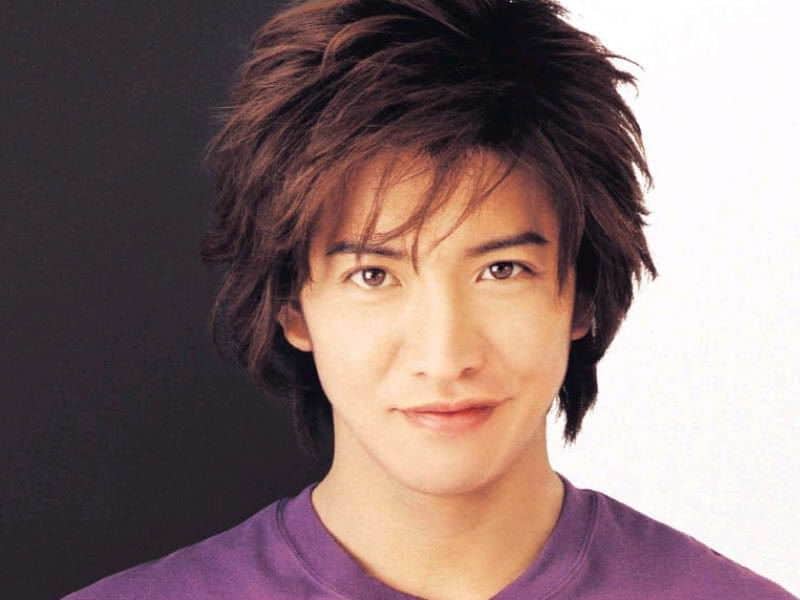
Takuya Kimura is perhaps one of the most famous names in Japan, and not just for his wonderful work on television and in films. Kimura is actually a former member of what was one of the premiere J-Pop boy groups called SMAP. SMAP really kicked off the wave of modern day J-Pop, along with other acts from the same company Johnny & Associates. SMAP debuted in 1988 and with some hiatuses in between remained a band till 2016. Over their incredible career they released 55 singles, and even more incredibly all of those singles ranked in the top 10 on Japan’s Oricon Charts (equivalent to America’s Billboard charts).
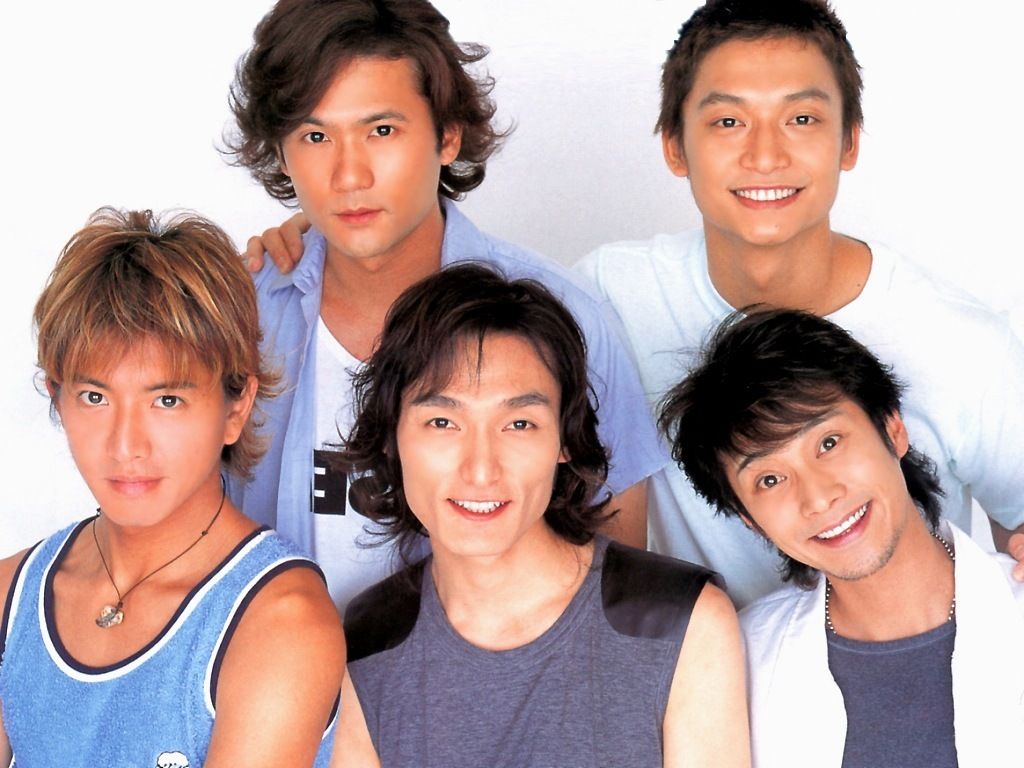
Kimura’s first starring role on television also began in 1988, as he played a leading role in Abunai Shonen III aka Dangerous Boy III. In America, we do not often expect pop stars to be actors as well (aside from Disney stars and Timberlake); however, for Japanese pop idols that is just part of the job. Kimura stood out even among his peers early on, as his prime time ascension really took off thanks to his role as Sena Hidetoshi in the 1996 TV show “Long Vacation”. For that role Kimura won Best Actor for both the Japanese Television Drama Academy Awards and the TV Life Annual Drama Grand Prix.
I first discovered Kimura in 2007, when I discovered his role as a young public prosecutor in the 2001 J-Drama Hero. Hero is one of top 10 most watched dramas in Japan. Incredibly enough Kimura has starred in 5 among those 10, so to say he’s a rating boon is putting it mildy. Hero did so well that the show returned not only for a special, but also a second season in 2014, and a feature film in 2015 – 15 years after the original show!
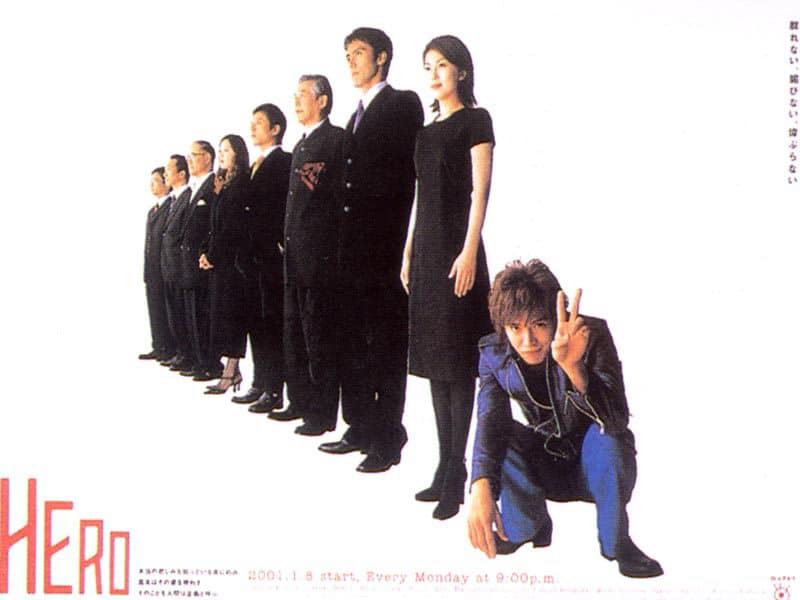
Hero not only helped further cement Kimura as a man to watch, but it also was the first in a series of characters he’s played that I would group together as “a likeable, idealist rule-breaker who always gets the job done despite any and all personal risk”. Basically he plays some version of Robin Williams’ character in Dead Poet’s Society. He’s great at this role. Kimura embodies this character type perfectly with his demeanor, his youthful smile, his innate ability at playing coy/naive, while also being ever so earnest. Frankly Kimura might be too great at this type of role as now he’s type cast to the point where every couple of years some version of this character returns. While I’m unsure about how he feels about this as an actor, I eat these roles up and I am so thrilled when I see such a role return.
In Hero, Kimura plays a public prosecutor who sticks out not just for his lack of dress code but also his idealism. Whereas his colleagues prefer by the book investigations, often from their desk more than the field, Kimura takes each case personally and investigates the case to the fullest extent. Understandably this is often unrealistic, as public prosecutors are pushed for time and often overloaded with cases; however, should there be such a prosecutor as Kimura no doubt you’d want him on your side.
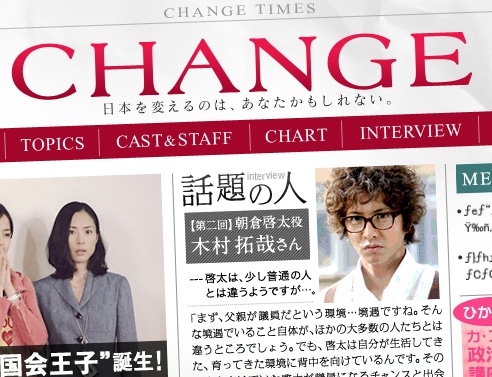
What started with Hero morphed next into Change!. Change! Is what happens when Mr. Smith Goes to Washington is written in the 2010s for a Japanese audience. In Change! Kimura plays the role of Keita Asakura, a school teacher who is quickly, and reluctantly, thrust into politics, only to ascend into the role of Prime Minister. His naivety, and earnestness as a teacher, puts him at odds with those in his party as well as the oppositions party. However he becomes a change agent in the process that you just can’t help but believe in and want to support! I laughed, cheered, and cried all through this show. Kimura’s performance was masterful, and the writing was just a marvel. I would put the last episode of Change! up as one of the finest episodes of television period.
After Change!, Kimura plays a slightly different, but still loveable character, in Mr. Brain. In one of Kimura’s rare crime dramas, Kimura plays Ryusuke Tsukumo in Mr. Brain. The role if Tsukumo is more akin to Robin Williams’ character in flubber — if he solved crimes as a neuroscientist. In Mr. Brain, Tsukumo’s brilliance is more his hindrance, than Kimura’s usual earnestness, so he still gets the job done all while brushing up against people and the rigid world of policing.
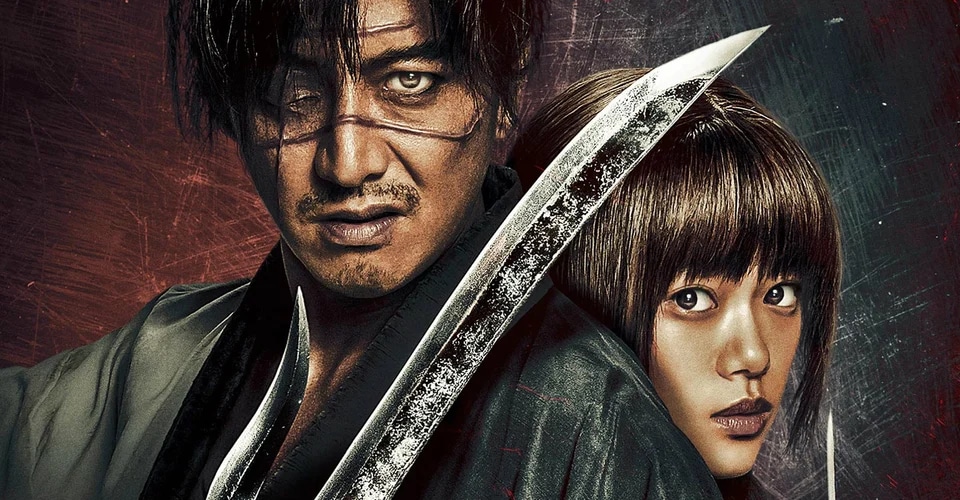
During the years 2010 and 2017, Kimura took time to play more adventurous roles that flexed his acting chops. From a down-on-his-luck salaryman in Priceless, to a time-hopping android in Ando Lloyd: AI Knows Love, to a mountaineer in post-WWII Japan in Nankyoku Tairiku, Kimura was able to explore new channels for his craft. Kimura even had the chance to star in a Takashi Miike film “Blade of the Immortal” in this time, thus bringing a famed director together with a famed actor to make movie magic. Even after all that though, perhaps with the return of Hero in 2014 (Hero 2), Kimura might have been ready to play a new version of this character trope again, as he does in 2017’s A Life.

A Life is a medical drama which out of all these shows seems the most serious. Not only does Kimura’s usual earnestness come off more as conceit, but his foe is personal and almost Monte Cristo-esque. In “A Life”, Kimura’s character Okita Kazuaki is a surgeon returning after 10 years away to the hospital where he first started out. What starts as a one-off surgery to save the director’s life, a former mentor and father of his ex-girlfriend , then evolves into a permanent position once his best friend/frenemy reveals his wife (the ex-girlfriend) has a brain tumor that only he can operate on. (Yes, melodrama much?) While his “friend” schemes behind everyones back in his play for power, Okita continues on in the mold of Kimura roles and bucks the system to prioritize patients first before all else. Though he’s certainly rougher around the edges, you cannot help but cheer for Okita, as you do for all of these classic Kimura roles.
What’s been exciting to see as Kimura grows and matures is that the roles often grow with him. I feel “A Life” was a perfect showcase for that middle-age, wiser but still earnest, version of Kimura’s classic role. You get enough of the “Hero” in him to like his character of Okita the surgeon, but you also know Kimura’s getting to tread some new territory. Of course, to continue growing as an actor Kimura’s less likely to continue to take these roles. In fact, I feel that even as he remains the lead in most of the shows he is in, he’s purposely chosen to play more anti-heros, or as near as they get in J-Dramas. While I will miss this character trope in his work, I know Kimura will continue to put out amazing work with each progressive show that I look forward to watching. Plus I know, I can always go back and rewatch the classics in the meantime.
Discover more from Centaku Media
Subscribe to get the latest posts sent to your email.

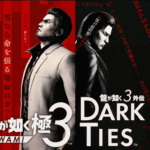


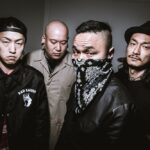



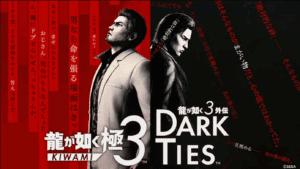
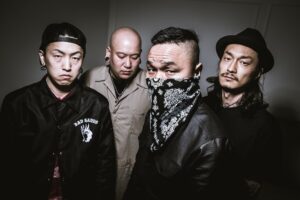

One thought on “Takuya Kimura: Birth of a J-Drama “Hero””